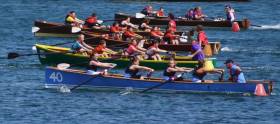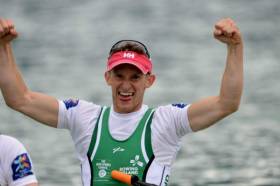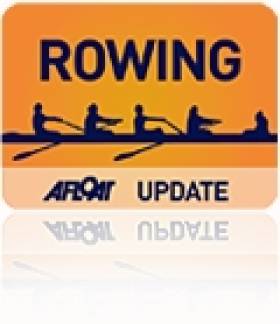Displaying items by tag: NRC
New Coastal Rowing Championships to be Hosted by Rushbrooke
#Rowing: Rushbrooke Rowing Club from Cobh will host the Irish Coastal Rowing Championships next August. It is the first such coastal event to be held under the auspices of Rowing Ireland.
The decision to choose Rushbrooke was made at the inaugural annual delegate meeting of the new Rowing Ireland Coastal Rowing Division in Portlaoise.
Rushbrooke submitted a detailed proposal to hold the championships at the National Rowing Centre in Cork and were given unanimous support. Delegates opted for the weekend of August 18th and 19th for the event.
Ted McSweeney, the chairperson of Rushbrooke Rowing Club said: “This is the greatest honour to be bestowed upon our club. Our club has been in existence since the early 1900s, and although the original club ceased in the late 1960s when the original wooden clubhouse and boats were engulfed by a fire, in 1989, local residents decided to restart the club and agreed on using the Yawl class racing boat. Over the last 28 years, we have gone from strength to strength and have established ourselves as one of the top coastal rowing clubs in Cork.
“As a club, we are delighted at the opportunity to host the inaugural Irish Coastal Rowing Championship and will endeavour to deliver an event that will meet the superb standards that have been set over the past few years. Even at this early stage, we have received immense support, both from the Coastal Rowing community and local organisations. We would like especially to thank the management team at the National Rowing Centre in Farran Woods, who have been exceptionally helpful and forthcoming in assisting us with our bid. A new chapter in coastal rowing has begun and Rushbrooke Rowing Club will strive to maintain the high standard of regattas that we have been accustomed to. We look forward to welcoming all Coastal Rowers to Cork in 2018 and we can assure you of a Ceád Míle Fáilte.’
Kieran Kerr, chairperson of the Rowing Ireland Coastal Division, said: “On behalf of Rowing Ireland, I would like to congratulate Rushbrooke Rowing Club on a very professional bid. We look forward to an exciting inaugural Irish Coastal Rowing Championships.”
Skibbereen Regatta Faces Major Challenge
#Rowing: The huge Skibbereen Regatta, the first Grand League event of the year, is under threat from the weather. The regatta is scheduled for Saturday and Sunday, April 9th and 10th, at the National Rowing Centre in Cork, but there have been strong winds in the area. The organisers say they may choose to limit the regatta to a single day on Saturday. A decision will be made public on Thursday.
Lightweight Four Fastest at Ireland Time Trial
#Rowing: The Ireland lightweight four was the fastest crew in the time trials this morning at the Ireland trial at the National Rowing Centre. Ranking on per centage of projected gold medal-winning time, the Shandon/Clonmel combination in the men’s junior double scull had the most impressive performance. Paul O’Donovan pulled out ill, while Claire Lambe has been injured, so Gary O’Donovan and Sinéad Jennings competed in the lightweight single. Both posted good times.
#Rowing: UCC’s Andy Harrington and David O’Leary won the men’s senior pairs title at the Irish Rowing Championships this morning. The young crew flew away from their opponents in the third quarter and won well from NUIG.
Trinity had a fine win in the men’s intermediate eights, finishing well under pressure from UCD, while Portora’s win in the men’s junior coxed four was even closer. They were caught by St Joseph’s of Galway coming up to the line, but pushed again and won – by .16 of a second.
The women’s races were won by clearer margins. Dervla Forde took the junior single sculls, Skibbereen’s Orla Hayes and Aoife Casey the intermediate double and Commercial the novice eights, all in impressive fashion.
Cathal Merz also led down the course to win the men’s club single sculls.
Irish Rowing Championships, National Rowing Centre, Cork (Day Two, Selected Results)
Men
Eight – Intermediate: 1 Trinity 5:46.51, 2 UCD A 5:49.27, 3 Queen’s 6:08.61.
Four – Junior, coxed: 1 Portora 6:36.84, 2 St Joseph’s 6:37.0, 3 Athlunkard 6:45.18.
Pair – Senior: 1 UCC 7:03.18, 2 NUIG 7:10.16, 3 Carlow 7:12.51.
Sculling, Single – Club: 1 Shandon (C Merz) 7:42.94, 2 Clonmel (D Lynch) 7:44.96, 3 Lee (D Larkin) 7:45.94.
Women
Eight – Novice: 1 Commercial 6:59.55, 2 Queen’s 7:13.67, 3 Trinity 7:13.67.
Sculling, Double – Intermediate: 1 Skibbereen 7:36.62, 2 St Michael’s 7:45.87, 3 Belfast BC 7:48.80.
Single – Junior: 1 Cork (D Forde) 8:07.98, 2 Skibbereen (E Hegarty) 8:18.01, 3 Offaly (A Mooney) 8:21.91.


























































